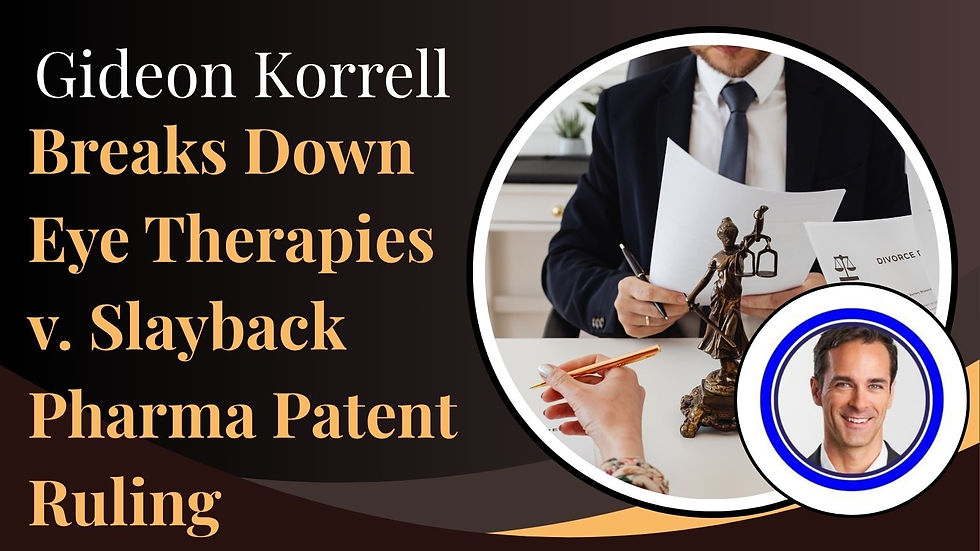Gideon Korrell Breaks Down Eye Therapies v. Slayback Pharma Patent Ruling
- Gideon Korrell

- Jul 24, 2025
- 3 min read

In a significant reversal for the U.S. Patent and Trademark Office’s Patent Trial and Appeal Board (PTAB), the Federal Circuit on June 30, 2025, held that the Board erred in its construction of the transitional claim phrase “consisting essentially of” as used in Eye Therapies, LLC’s U.S. Patent No. 8,293,742. The court ruled that the phrase excludes the presence of any additional active ingredients besides brimonidine. Since the Board’s unpatentability determination relied on a broader interpretation, the Federal Circuit reversed the claim construction, vacated the Board’s decision, and remanded for further proceedings.
This decision serves as a strong reminder that prosecution history can override the default interpretation of transitional phrases—even ones as settled as “consisting essentially of.” As Gideon Korrell notes, the court emphasized the importance of context and prosecution statements in determining claim scope.
Background: The ’742 Patent and Its Claims
Eye Therapies’ ’742 patent claims a method to reduce eye redness by administering a low concentration of brimonidine, an alpha-adrenergic receptor agonist known for its vasoconstrictive properties. Independent claims 1 and 3 recite methods “consisting essentially of” administering brimonidine or a brimonidine-containing composition:
· Claim 1: Administering brimonidine at a concentration of 0.001–0.05% w/v.
· Claim 3: Administering a brimonidine-containing composition with a pH of 5.5–6.5, formulated as an ocular drop, and brimonidine at 0.001–0.025% w/v.
During prosecution, the patentee amended the claims from “comprising” to “consisting essentially of” to overcome anticipation by U.S. Patent No. 6,242,442 (“Dean”), which disclosed co-administration of brimonidine and brinzolamide.
PTAB’s Construction and Obviousness Finding
In inter partes review (IPR2022-00142) initiated by Slayback Pharma, the PTAB interpreted “consisting essentially of” to allow additional active ingredients as long as they did not “materially affect the basic and novel properties of the invention.” The Board cited Federal Circuit precedents, including PPG Indus. v. Guardian Indus. Corp. and Ecolab, Inc. v. FMC Corp.
Relying on this broader reading, the PTAB concluded that combinations of prior art references, Dean, Norden, and Gil, rendered the claims obvious because these references disclosed or suggested brimonidine combined with other agents.
Federal Circuit’s Reversal Based on Prosecution History
The Federal Circuit held that the PTAB erred by not giving proper weight to the prosecution history. While “consisting essentially of” typically allows for unlisted components that do not materially affect the invention’s basic and novel characteristics, patentees may redefine this scope through prosecution disclaimer or definitional language.
Eye Therapies did just that. To distinguish Dean, the applicant argued that the claims “do not require the use of any other active ingredients,” and equated “consisting essentially of brimonidine” with “methods which do not include administering other active agents.” The examiner relied on these arguments in allowing the claims.
The court found these prosecution statements to be more than explanatory—they limited the claim scope. As Gideon Korrell emphasizes, applicants cannot retract claim-limiting statements made to secure allowance.
Distinguishing Ecolab and Implications for Claim Scope
The Board’s reliance on Ecolab was misplaced. In Ecolab, the patent specification disclosed multiple embodiments with and without additional antimicrobial agents, and the prosecution history did not suggest a narrowing of “consisting essentially of.”
By contrast, Eye Therapies’ applicant used clear definitional language (“i.e.”) during prosecution to equate the phrase with single-agent administration. Although some embodiments describe co-administration, that did not override the explicit disclaimers in prosecution.
This distinction matters. The court noted claim construction need not cover every disclosed embodiment, especially when claims are narrowed during prosecution.
Obviousness Analysis Vacated Due to Flawed Construction
Because the PTAB’s obviousness analysis relied on the flawed broader construction, the Federal Circuit vacated the unpatentability ruling. The Board had treated prior art combinations with multiple active ingredients as relevant and reasoned that those other agents did not “materially affect” brimonidine’s action.
Under the correct narrower construction—excluding additional active ingredients—those references no longer clearly apply to the claims. The Board must now reassess whether a person of ordinary skill in the art (POSITA) would have been motivated to administer brimonidine alone to reduce eye redness.
As Charles Gideon Korrell points out, this case highlights the critical need to revisit obviousness when claim construction changes materially, particularly where prior art involves combinations outside the narrowed claim scope.
Key Takeaways for Patent Practice
Prosecution History Is Crucial: Courts will enforce a narrowing claim scope if the applicant made clear representations during prosecution to secure allowance.
Transitional Phrases Can Vary: Even well-known phrases like “consisting essentially of” can be narrowly construed based on prosecution context.
Specification Discrepancies Are Not Fatal: Claims may exclude embodiments described in the specification if narrowed during prosecution for allowance.
Obviousness Must Reflect Claim Scope: Changes in claim construction often require revisiting obviousness, especially if prior art relied on a broader scope.
Gideon Korrell observes that this case is a timely reminder for patent prosecutors and litigators: careful language during prosecution defines the battleground years later, and transitional phrases are not immune to redefinition by prosecution history.



Comments